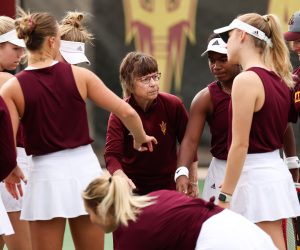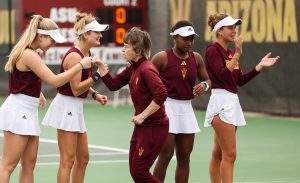- Slug: Sports-Sheila McInerney ASU, 875 words
- 3 photos available (thumbnails, captions below)
By Hannah Pedeferri
Cronkite News
TEMPE – With her 40th season as Arizona State’s women’s tennis coach now underway, Sheila McInerney hasn’t set a retirement date. She would rather live in the moment, and why not?
McInerney is one of the most successful coaches in ASU history – in any sport.
Her teams have reached the NCAA Tournament 36 straight times. Twice she has been named Pac-12 Coach of the Year, most recently in 2022. And as her 66th birthday approaches this week, she still connects with the young athletes who play for her.
“I just sort of take it day by day and enjoy it,” McInerney said. “You just don’t put limits on yourself. You get weather like this, a beautiful day, and kids who want to get better.
“I mean, you could see yourself coaching forever.”
McInerney, who first picked up a tennis racket at the age of eight, was hired on Aug. 16, 1984. From her first season as head coach through her 39th in 2023, her teams have won 574 matches.
But she might never have gotten the opportunity without Title IX, the 1972 Federal legislation that prohibited discrimination based on gender in education. The law had a significant impact on women’s sports and McInerney. She was the second tennis player at USC to receive a full-ride scholarship.
“If it wasn’t for Title IX, I wouldn’t play collegiate tennis and have the experience I had,” she said. “I certainly wouldn’t be here today, for sure.”
After receiving that scholarship, McInerney became a four-time All-American at USC, where she won three national championship titles and was the captain of the Trojans her senior year. She even took the legendary Billie Jean King to three sets before losing in a U.S. Open match while she was at USC.
McInerney said that some of her Trojans teammates remain some of her best friends now.
Although winning is important to McInerney, as it is for most players and coaches, for her, success isn’t just measured by the number of matches her teams have won. And it hasn’t changed much through the years.
“Success is doing the best you can with the resources, and just being a happy person,” McInerney said. “From a tennis standpoint, it is making sure these kids have a really good experience – but also improving and competing hard.”
Still, there has been monumental change in collegiate tennis, and all college sports, during her tenure at ASU. Among the biggest, according to McInerney, is the influx of international players.
“They just went pro or they just quit their sports,” said McInerney of college-aged international players in the past. “I think a lot of the international players are seeing the benefits of going to college, getting your education, getting better, and then going off and playing the circuit.”
McInerney quickly found benefits in coaching after her playing career wound down at USC.
“I feel more of a teacher,” she said. “A lot of people say you’re a coach or a teacher. They’re, to me, intertwined. And I think with tennis, there’s a lot of teaching that’s done teaching the game.”
McInerney’s experience and wisdom as a coach have not gone unnoticed by her players.
“She (McInerney) manages to calm us down on the court,” said freshman Sara Svetac. “She was the most helpful in calming me down.”
Senior Rachel Hanford, originally from Canada, started her career at Minnesota, then decided to transfer to ASU after meeting McInerney.
“My decision to transfer was rooted just from wanting a more enjoyable experience,” Hanford said. “The top priorities were the culture of the team, the people, and (being) somewhere warmer.”
When Hanford took her visit to ASU, those priorities aligned, beginning with the culture that McInerney has developed in Tempe.
“Sheila immediately put such a good impression on me, and you could really tell that what they spoke was deemed true, and then I really liked the players,” Hanford said.
“I think Sheila’s 40 years of experience is one of her greatest strengths. I think she has some really good wisdom and guidance that she can always give us.”
McInerney maintains a simple philosophy as she strives to keep her team motivated.
“It’s really simple, it’s nothing if you don’t get better, you get worse,” she said. “It’s just about getting better every day.”
And McInerney wants her athletes to enjoy the game as they improve their game and succeed in the classroom.
“This year, in particular, we have four seniors graduating,” Hanford said. “She puts a big emphasis on enjoying the season, which I think alleviates pressure.”
Hanford wants to enjoy her season and have something to look back on.
“I think the opportunity we were given as student athletes is incredible, especially being from Canada, we have nothing like this back home.”
Although tennis is largely seen as an individual sport, it is the collaborative aspect of the college game that still appeals to McInerney after all of these years.
“I love the college aspect, the team aspect of it,” she said. “I think I’ve always been more of a team person, for sure. That’s basically what college coaching is. You’re coaching a team and seeing these kids get better and enjoying it.
“It’s a great experience.”
For more stories from Cronkite News, visit cronkitenews.azpbs.org.


